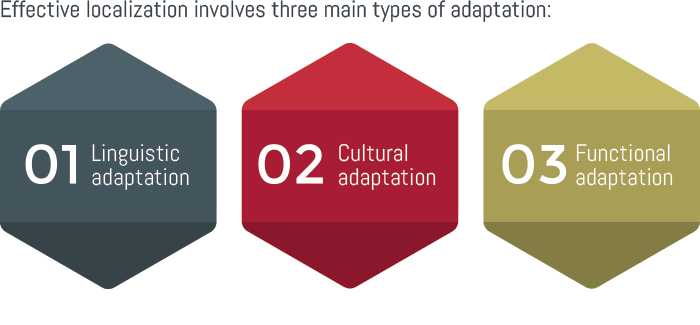Ever heard that “the best place to hide a dead body is page two of Google search results?” It is a bit of a morbid joke, but it does speak to a harsh reality: a company’s fate hinges on its online presence. For many people, including potential customers, if a business isn’t online, it simply doesn’t exist. Plus, beyond presence alone, for a website to attract attention, it has to top people’s search results.
This is where search engine optimization or SEO—your webmaster’s favourite term—comes in. Essentially, SEO stands for the array of strategies used to improve a website’s visibility in search engine results.
Translation is a key part of those strategies. Done well, it can greatly enhance a site’s search engine ranking, which, in turn, increases its visibility to potential customers. Done badly, it can have the opposite effect. Read on to learn how and why.
Localization, or translation of digital content
Localizing a website involves translating and adapting all of its textual, visual and functional elements, tailoring them to the specific needs of each target culture and market. It encompasses anything that is visible to Internet users or picked up by search engines, keeping in mind that the most popular search engines can vary from country to country.
In this global age, localization has become indispensable. Companies can no longer afford to promote themselves and their products and services online in one language alone, even if that language is English, a so‑called universal language.
E-commerce statistics
According to a recent report from a top language-industry research firm
- 75% of consumers in non-anglophone countries prefer to buy products using their native language, and
- 60% of those consumers rarely or never buy products from English-only websites.
Fundamentals of effective localization

Linguistic adaptation
Search engines use incredibly sophisticated algorithms to filter and rank websites. These algorithms are intelligent enough to distinguish quality material created by real people from content auto-generated by a program.
Since 2011, Google has been using an algorithm called Panda to move lower-quality sites down in ranking. To determine a website’s quality, Panda asks the following kinds of questions:
- Does the content contain factual errors or spelling, stylistic and syntactic mistakes?
- Is the content well written, or does it seem sloppy or as though it was rushed, with little heed to detail?
The better your website’s linguistic content is translated, the higher it will be ranked by search engines such as Google and the more likely it is to appear at the top of Internet users’ search results. That’s why it really is worth entrusting your website’s translation to language professionals.
Conversely, if you run your website through automatic translation software or put it in the hands of translators without the necessary education and experience, the algorithms could classify it as being of poor quality. This will give it a low ranking and relegate it to the bottom of the search results. The worst thing for a site’s visibility is automatically translated content so bad that search engines deem it gibberish.
Other issues with subpar content
Do you use a tool like AdSense that has Google automatically place paid advertising on your website? If search engines give your content a bad ranking, your account could be deactivated.
Cultural adaptation
When you invest in quality adaptation for your target market by experts who know the culture, you are sending your potential customers three compelling messages:
- We understand you.
- We respect you.
- We care about your needs and your culture enough to have taken every detail into consideration, right down to the colour scheme and layout.
Are search engine algorithms smart enough to evaluate a website adaptation’s cultural quality? Not exactly. However, they can do so indirectly by analyzing user behaviour based on a number of factors, including:
- the organic click-through rate, or the proportion of users sufficiently drawn to your site from the search results page to immediately click on the link;
- the average time users spend on your site;
- the number of pages consulted per visit.
The more users immediately click on and view pages on your website, and the longer they stick around, the more probable it is that the search engine will perceive your site as having high-quality content for that market. This increases the likelihood that it will obtain an excellent ranking and appear at the top of the results.
So what if you don’t quite realize what is at stake and you fail to properly adapt your website to the culture you’re trying to reach? Well, you could end up alienating visitors and watching your site fall lower on the search results page, losing precious customers and revenue in the process.

Functional adaptation
Functional adaptation means adapting the structural and programming elements, which directly affect how readily your customers and search engines can find and read your content.
For this facet of the adaptation process, you need a multidisciplinary team of experts who know their jobs inside out. A team of language professionals alone will not be enough: you need technical experts too, as websites contain a wealth of metadata with very specific technical requirements. The way information is arranged on the pages also has to be taken into account. For instance, for languages that read from right to left, the structure will be different than with languages that read from left to right. Even font choice can make a difference—using the wrong font can make your content unrecognizable to search engines.
The importance of keywords
The programmers who created your original website began by performing thorough analyses to identify the relevant keywords users are most likely to query (including common but linguistically incorrect phrases). Depending on the size of the site and the subject matter covered, hundreds of keywords can be strategically placed throughout your texts. These keywords make it easier for people to find your company using search engines, and help rank your site above the competition.
When your site is being localized, lists of equivalent keywords have to be compiled for each language and market. Most of the time, this process is more involved than direct translation alone, as users searching in different languages will not necessarily use the same terms or enter them in the same order. There is quite a difference between how a Korean and a German will phrase a query for a centrally located, air‑conditioned hotel, for example.
High-quality localization therefore involves performing both linguistic and cultural research and then effectively integrating keywords into the content. This should be an integral part of any serious language partner’s localization solutions and expertise.
One failed version can affect your whole site
You might think that a poor translation of your website would not affect the original version’s search engine performance, but that assumption would be wrong. Search engine algorithms come up with an overall ranking based on all of a site’s pages. You may have an excellent English website, but the entire site’s ranking could plummet if you add French, Spanish and Chinese versions that leave something to be desired. This is just one more reason to take localization seriously!
Versacom’s expertise is at your disposal
You can depend on Versacom’s proven localization expertise and sound, professional process. From analyzing socio‑cultural factors and performing expert keyword research to adapting your content, we offer a full range of linguistic and technical services to meet your every need and ensure that your project is a success. With Versacom’s localization solutions, you are guaranteed a search engine-friendly website that matches exactly what your customers are looking for.
Consult our Localization page to learn more, and don’t hesitate to request a free consultation.


